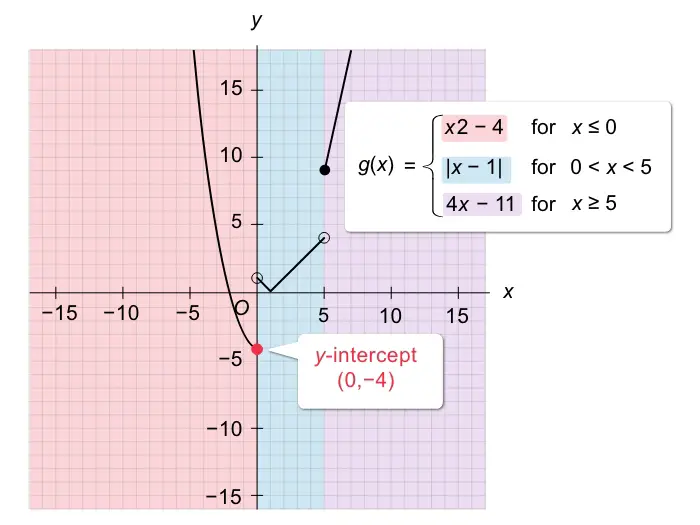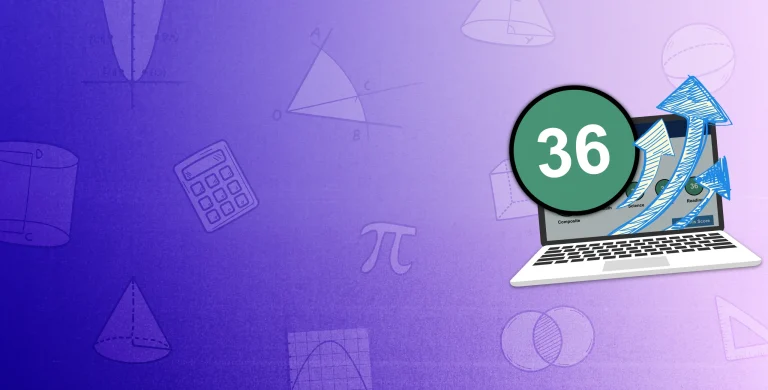Perfecting how to study for ACT® Math involves understanding its structure and effective strategies for success. In this complete guide, you'll get access to ACT Math tips and study plans specifically designed to tackle the unique challenges of the Math section, such as algebra, geometry, trigonometry, and elementary statistics. You'll establish a strong mathematical foundation by focusing on core concepts and incorporating strategic practice and review. You'll also learn how detailed study materials and practice tests, like those offered by UWorld, cultivate deeper learning and boost your confidence, leading you to achieve higher scores and excellence in ACT Math.
ACT Math Test Overview
| Format of ACT Math | Topics Tested in ACT Math |
|---|---|
|
|
The ACT Math section presents students with 45 multiple-choice questions that they need to complete within 50 minutes. It covers various topics, such as number and quantity, algebra, Functions, geometry, and statistics and probability. The section is designed to progressively get more challenging and allows the use of calculators for all questions. Scores for this section range from 1 to 36. If you want to dive deeper into what is tested on the ACT Math, feel free to check out our comprehensive guide about the ACT Math test on the subject.
How to Study for the ACT Math Section
To best learn how to study for the ACT Math, it's necessary to adopt a structured study plan. Regular practice and a deep understanding of math fundamentals lay the foundation for success. By tailoring your study schedule to include a variety of math problems and revisiting core concepts, you can ensure comprehensive preparation and feel confident on test day.
How to Do Well on the ACT Math Section
To excel in the ACT Math section, you need a strategic approach. Here are some tips:
-
Create a Study Schedule:
Create a customized schedule that dedicates specific time slots to different math topics, so you cover everything evenly.
-
Practice with Timed Quizzes:
Practice under test-like conditions by setting a timer for your practice sessions. This will help you improve your speed and accuracy under pressure.
-
Review and Revisit:
Regularly go over challenging concepts and revisit any previous errors you've made. This will help you solidify your understanding and avoid repeating the same mistakes.
-
Use Realistic Practice Questions:
Incorporate ACT practice questions that closely resemble the ones you'll encounter on the actual test. Our ACT Math QBank is a great resource for this, as it provides questions that mimic the style and difficulty level of the real test.
Tips to Get a 36 on the ACT Math
By focusing on these strategies, students can significantly improve their ACT Math score and increase their chances of scoring a perfect 36:
-
Master High-Yield Topics:
Focus on mastering areas that are frequently tested on the ACT, like algebra and geometry, to maximize scoring potential.
-
Advanced Preparation Techniques:
Challenge yourself with difficult and higher-level practice problems to build proficiency beyond the basics.
-
Analyze and Learn from Mistakes:
Carefully review incorrect answers to understand mistakes and avoid repeating them in future practice tests.
-
Efficient Time Management:
Develop strategies to allocate your time effectively across questions, ensuring that you have enough time for the more challenging problems.
-
Regularly Take Full-Length Practice Exams:
Practice taking full-length, timed practice exams under test-like conditions to build stamina and become accustomed to the exam's pacing.
How Do You Study on Your Own for the ACT Math Section?
To study independently for the ACT Math section, focus on mastering core mathematical concepts through practice problems, review targeted strategies using resources like UWorld, and take timed practice tests to enhance speed and accuracy. Our materials are comprehensive and provide a variety of practice questions and detailed explanations, making self-study easier and more productive. By creating a study plan that suits you and using UWorld's resources regularly, you'll be able to build a solid math foundation and feel confident on test day.
How Long Should You Prepare for ACT Math?
The amount of time you should spend preparing for the ACT Math section can vary. In general, a 6-month study plan provides a thorough and relaxed approach. However, if you already have a strong foundation in math, 3 months should be enough. Even if you tend to prepare at the last minute, a focused 1-month plan can still result in noticeable improvements. During the actual test, aim to allocate about one minute per question. This will help you maintain a good pace, ensure you have enough time to address each question, and allow some extra time to review and tackle more difficult problems.
ACT Math Study Plan
Our ACT Math study plans are crafted to help you master the math section of the ACT through structured practice, targeted reviews, and strategic test-taking. Whether you have 6 months or just 2 weeks to prepare, these plans are designed to boost your performance through intentional, consistent practice and concept reinforcement.
With 6 months to prepare, you’ll build deep conceptual understanding, refine your math strategies, and practice under test-like conditions.
Month 1: Diagnostic+ Core Concepts
- Take a full-length ACT with focus on Math section scoring.
- Identify your weakest math domains (e.g., algebra, geometry, data analysis).
- Create a weekly plan (5 days/week, 1 hour/day).
- Focus weekly on one math domain (Week 1: Number & Quantity, Week 2: Algebra, etc.).
- End the month with another full-length math section test.
Activities:
- Log mistakes in a math-specific error journal.
- Review foundational concepts (fractions, equations, functions).
- Begin using a formula sheet.
Month 2: Strengthen Your Foundation
- Focus on your two weakest math areas.
- Do untimed drills to build confidence, then timed drills to build stamina.
- Take a full math section test every other weekend.
Activities:
- Flashcards for common formulas and rules.
- Practice with data interpretation and word problems.
- Maintain your math error log.
Month 3: Practice by Problem Type
- Group problems by type (linear equations, functions, probability).
- Learn shortcuts and strategic approaches for each type.
- Take 2 full-length math section tests.
Activities:
- Write step-by-step solutions to past mistakes.
- Apply pacing strategies (e.g., 1 question per minute).
- Work on mixed-topic problem sets.
Month 4: Realistic Testing
- Take one full-length ACT each week and analyze math performance.
- Practice problem sets on alternate days.
- Rest one day per week.
Activities:
- Identify timing issues and mental fatigue patterns.
- Refine test-day math strategies (e.g., plugging in, eliminating).
- Review previously difficult concepts.
Month 5: Polish and Practice
- Focus only on your toughest question types.
- Use official ACT math practice tests.
- Take 2 full-length ACTs with 5-day review periods.
Activities:
- Create math summary sheets or concept maps.
- Teach math problems to reinforce your understanding.
- Address recurring errors with new strategies.
Month 6: Final Stretch
- Weeks 1–2: One full ACT per weekend, light review on weekdays.
- Weeks 3–4: Review only — avoid new topics.
- Test Week: Stay relaxed, review notes, and get solid sleep.
A 3-month timeline allows you to reinforce key concepts and test strategies while maintaining consistent practice.
Month 1: Build a Foundation
- Begin with a timed, full-length ACT practice test.
- Prioritize 1 hour/day to ACT math-style questions.
- Focus more time on algebra and geometry if these are weak.
- End each week with a math quiz or practice section.
Month 2: Improve Weaknesses
- Identify patterns in errors and practice those areas deeply.
- Use timed drills to improve pacing and accuracy.
- Practice trickier topics like functions, matrices, and statistics.
- Take a full math section every other weekend.
Month 3: Review and Simulate
- Maintain targeted drills with a focus on timing and endurance.
- Avoid learning new content — review your journal and notes.
- Take one full-length ACT per weekend until test day.
Weeks 1-2: Strengthen Weak Areas
- Dedicate ~10 days to your weakest math topics.
- Focus on explanation creation, journaling errors, and time tracking.
- Alternate easy and hard topics to avoid burnout.
Weeks 3-4: Test-Like Practice
- Take a full-length math section every weekend.
- Focus on timing strategies and accuracy.
- Review all errors and lightly revise notes before the exam.
Check out our One-Month Study Plan for the ACT to get more help with improving your score.
Week 1: Identify Weak Areas
- Take a full-length ACT practice test to find math weaknesses.
- Drill ACT-style math questions for 1 hour daily.
- Prioritize time-consuming or confusing topics.
Week 2: Practice Smart
- Focus on pacing and accuracy with daily timed sets.
- Take at least one full-length ACT with detailed math review.
- Use your error log and formula sheets to review — don’t cram new material.
ACT Math Test Study Tips
When you're getting ready to study for this exam section, ACT Math tips can make a big difference. 1 thing to keep in mind is that using your calculator wisely is key. It's important to understand how it works and not to rely on it for simple calculations. This way, you can save time when you need it the most. Another effective strategy is to make good use of scratch paper. It can help you organize your thoughts and work through challenging problems step by step. Don't forget to read and comprehend each question carefully. This will help you avoid common errors and ensure your answer addresses the problem directly. And remember, it's always a good idea to double-check your answers. This can help you identify any mistakes and enhance your accuracy.

Review Math Concepts
Mastering essential formulas and skills in algebra and geometry is pivotal for excelling in the ACT Math section. You'll need to memorize several ACT Math formulas for the test, including those related to geometry, algebra, and trigonometry. These formulas are essential for efficiently solving a variety of math problems. To improve your algebra and geometry skills, it's important to focus on understanding core concepts, practicing problem-solving techniques, and applying these skills to different types of ACT Math questions.
How Should You Approach Questions on the ACT Math Test?
Approaching questions on the ACT Math test effectively involves a strategic and methodical process. To solve problems efficiently, make sure you're familiar with the typical question types and practice using efficient methods like process of elimination or plugging in values. If you encounter a challenging problem, don't get stuck on it for too long. Instead, move on and come back to it later if you have time. Mastering these strategies will greatly enhance your performance. For hands-on practice with these techniques, try working through an ACT mock test alongside our full guide on how to solve ACT Math questions.
Work on Your Timing
Effective time management in the ACT Math section is crucial for performing at your best. It's important to give yourself about one minute for each question, focusing on solving the easier problems first to save more time for the harder ones. If you come across a question that seems too challenging or time-consuming, it's a good idea to skip it for now and come back to it later if you have time left. Using this strategy, you'll be able to answer as many questions as possible within the 60-minute time limit. Practicing with timed quizzes is a great way to improve your time management skills for the test.
Focus On Your Areas for Improvement
When getting ready for the ACT, it's important to concentrate on the sections where you need to improve. This strategy involves spotting and focusing on particular topics or types of questions that have given you trouble in the past or where you haven't been consistent in your performance. By spending more time practicing and reviewing in these areas, you can turn your weaknesses into strengths, ultimately leading to a more balanced performance on test day. Taking free ACT practice tests and analyzing your results is a great way to identify these areas and keep track of your progress over time.
What Are the Most Common Mistakes to Avoid On the ACT Math?
To avoid making common mistakes in the ACT Math section, it's important to pay attention to details. This means being careful not to misread questions, make careless arithmetic errors, or misunderstand key math concepts. If you're not sure about an answer, it's better to make an educated guess instead of leaving it blank because there's no penalty for wrong answers on the ACT. Make sure to allocate time for reviewing and practicing these challenging areas.
Take High-Quality Practice Tests
Using high-quality practice tests is an important aspect of ACT Math preparation, and our ACT Math practice tests are a great resource for this purpose. These practice tests replicate the real exam conditions, helping you become familiar with the format and question types you will face. Regularly practicing with these tests can greatly enhance your problem-solving speed and accuracy, and they are essential for pinpointing areas that require additional study.
ACT Math Review/Study Materials
When it comes to ACT Math prep, UWorld's question bank and ACT practice questions are a must-have. Our extensive range of problems touch on all the math topics you'll encounter on the ACT. Plus, each question comes with detailed explanations, helping you grasp the concepts better and fix any mistakes you make. To top it off, these practice tests recreate the actual exam conditions, giving you a chance to get used to the format and timing. By practicing regularly with these materials, you'll see a significant improvement in your confidence and skills for the ACT Math section.
Key Takeaways
ACT Math preparation involves following a structured approach that hones in on key math concepts, managing time efficiently, and practicing regularly using high-quality resources. It's crucial to highlight areas that need improvement, exercise caution with common mistakes, and make the most of practice tests. UWorld's question bank and full-length practice tests are incredibly valuable tools for comprehending and conquering the ACT Math section, enabling students to develop confidence and expertise for the test.

Frequently Asked Questions (FAQs)
What topics are covered in the ACT Math section?
The ACT Math section covers a broad range of topics, including algebra, geometry, trigonometry, and elementary statistics. These areas encompass various subtopics like linear equations, functions, probability, and coordinate geometry, among others.
How is the ACT Math section scored?
ACT Math is scored on a scale from 1 to 36. Each question carries the same weight when determining your final score. Your raw score, which is based on the number of correct answers, is then converted to a scaled score. It’s important to note that there are no penalties for incorrect answers.
Are calculators allowed on the ACT Math section?
Yes, you can use calculators in the ACT Math section. However, there are certain types and models that are allowed, so it’s important for students to review the ACT’s calculator policy to make sure their device is compliant.
References
- ACT. (2024). ACT Math Test Tips. Retrieved January 29, 2024, from https://www.act.org/content/act/en/students-and-parents/high-school-success/testing-advice-for-the-act/act-math-test-tips.html
- ACT. (2024). Math Practice Test Questions. Retrieved January 29, 2024, from https://www.act.org/content/act/en/products-and-services/the-act/test-preparation/math-practice-test-questions.html?page=0&chapter=0
- UWorld College Prep. (2024). ACT Math Test. Retrieved January 29, 2024, from https://collegeprep.uworld.com/act/math-test/
Read More Related Articles
Enhance your ACT Math performance with key strategies and techniques for diverse question types. Click here to elevate your problem-solving skills with precision.
About ACT MathGain a thorough understanding of the ACT Math section, including different types of questions, the difficulty level, covered content areas, and the overall test layout.



